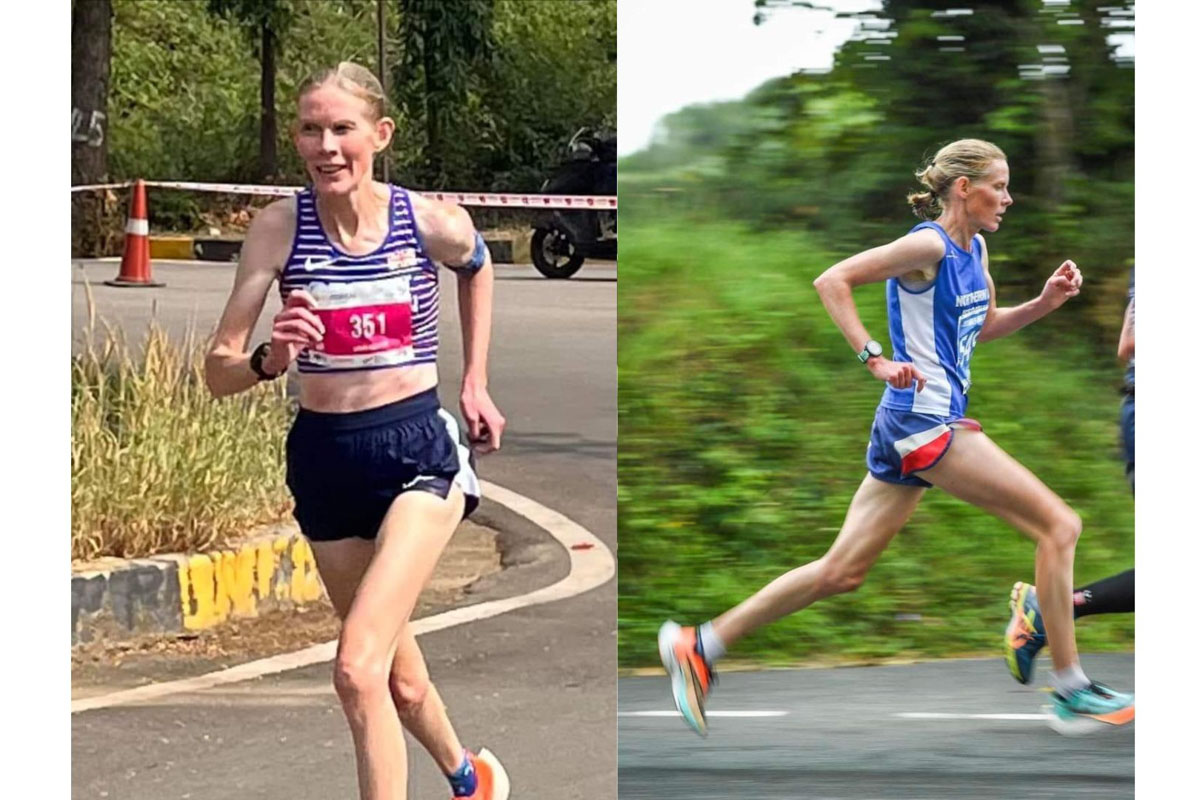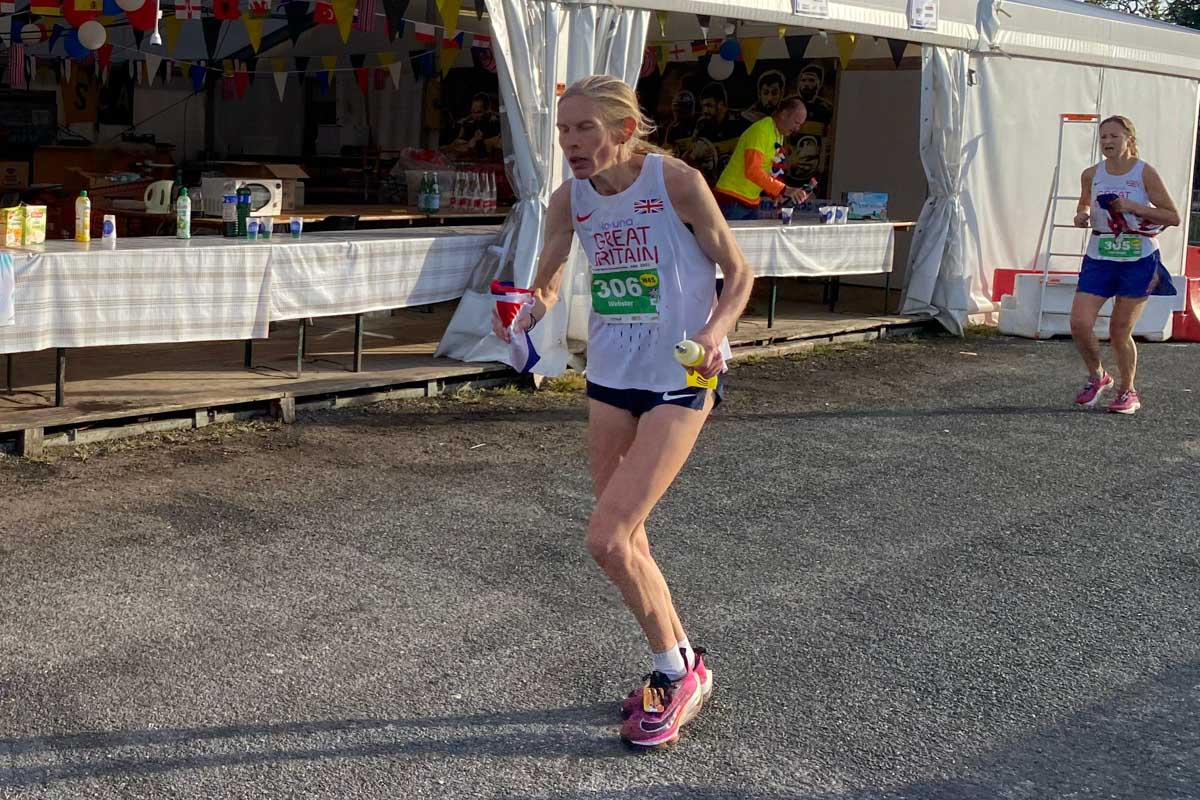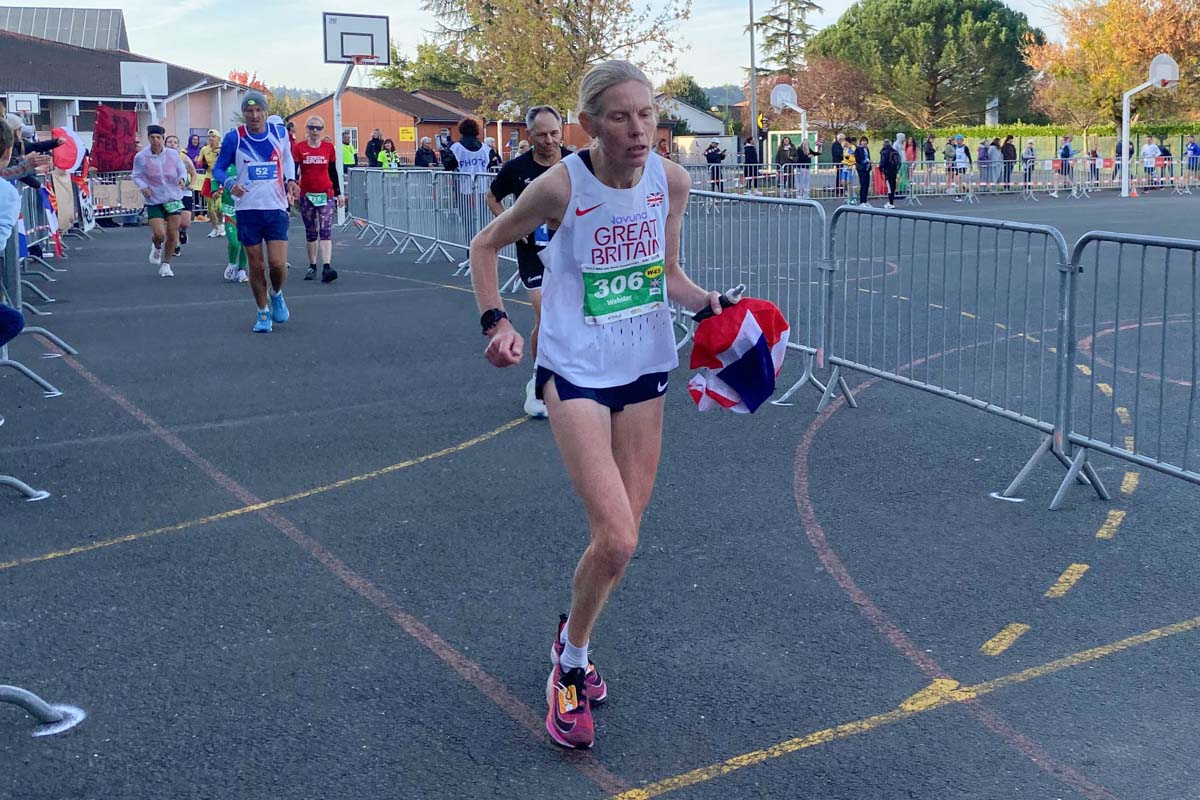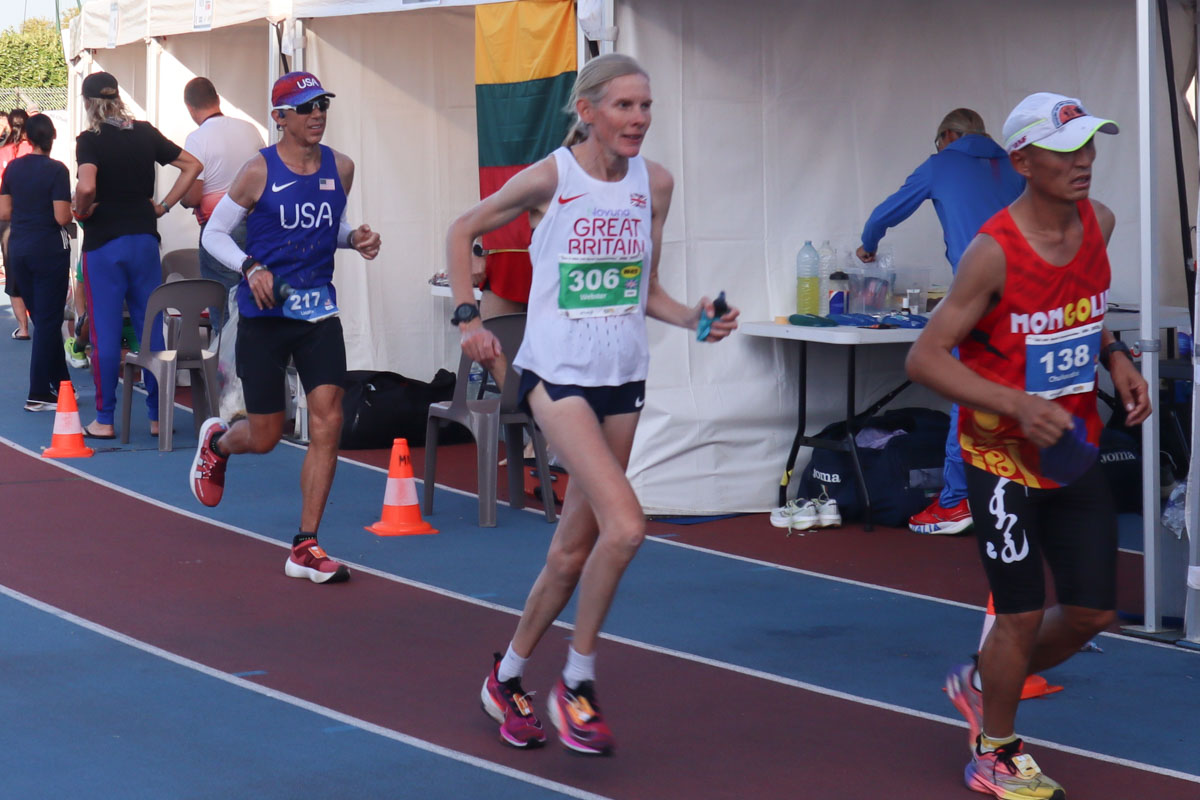When Great Britain’s Sarah Webster surpassed the women’s 24-hour world record at the 2025 IAU 24-Hour World Championships in Albi, France, on October 19, she still had a full hour left to race and add mileage to the previous mark. She would end up running 278.622 kilometers (173.127 miles), breaking the previous record held by Japan’s Miho Nakata by 8.259 kilometers (5.131 miles), set in 2023.
In only her second 24-hour race ever, Webster executed exceptional pacing throughout the event. Averaging 5:11 minutes per kilometer (8:19 minutes per mile), including any breaks needed over the 24-hour period, her pace remained incredibly consistent throughout the event, only slowing in the final hours. As she describes in the following interview, it was all part of her plan.
Webster, who is 46 years old and not a professional runner, was third at both the 2024 IAU 100k World Championships and the 2023 IAU 50k World Championships. She qualified to represent Great Britain at this year’s 24-hour world championships by running 243.393 kilometers (151.237 miles) in 24 hours at the qualifying event this past April, and had to work her training around a dislocated shoulder leading up to the event.
Learn more about how her race played out in this transcribed interview, and read our 2025 IAU 24-Hour World Championships results article and our news article about her world record to learn more about this year’s race and Sarah’s performance.
[Editor’s Note: This interview has been lightly edited for clarity.]
iRunFar: Congratulations. What an enormous thing that you’ve just done. How do you feel?
Sarah Webster: I don’t think it’s quite sunk in. Yeah, just feeling very tired generally. And obviously, legs are still a little bit sore. But yeah, I can’t quite get my head around it all.
iRunFar: I imagine it’ll take a while. How’s your body feeling?
Webster: Better today. I can now sit down and stand up without thinking too hard about it, so that’s good. But getting down on the floor and getting back up again is still quite hard.
iRunFar: Before we talk about the race, I just wanted to ask a bit about your history with running, where you started out, and what brought you to doing the 24 hours now?
Webster: I ran as a junior, just did club running, mostly track, cross country, because I had to. I did the very occasional road race, but mostly on the track. Then I gave it all up in my final year at university and concentrated on getting my degree. I didn’t go back to running until my daughter was four and she was going to school, and I had time on my hands. My husband was like, “I think you should start running again.” I was like, “Really? You really don’t know what you are asking.” He’s like, “No, it’s fine. I’ll support you.” And yeah, he had no idea what it was going to involve. I did a half marathon, and then I was like, “Oh, actually, I think I’ll go back and do some track.” So I did some track and I represented the Isle of Man in the Ireland Games in the 1,500 and 5,000 meters.
Then I was like, “No, this is too hard. I can’t do this anymore. I’m getting too old.” I went back on the road, did some more half marathons, then I moved up to a marathon, and that was really good. Really started enjoying doing marathons. And then somebody posted, “Oh, the standard for getting a GB [Team Great Britain] vest for the IAU 50k World Championships, you only have to have run a marathon.” And it was 2:45, which is what I had. I was like, “Oh wow, a GB vest. That would be a dream come true.” I didn’t get it then, there were better runners ahead of me, but the fact that I could was what started me thinking about it.
Then everything got a bit delayed because COVID-19 hit. And then I was trying to qualify for the Commonwealth Games Marathon for the Isle of Man, so that delayed the process. Otherwise, I probably would’ve done a 50k sooner. But then I saw that I could get an England vest with my marathon time for the 100k. So I naively applied for 100k place on the England team, and naively informed them that I was going to try and break the British record, and actually exceeded my expectations of the race, and decided that 100ks were quite good fun. I had to do a 50k fairly soon after that, because I had to qualify if I wanted a GB vest for the IAU 50k World Championships, which I managed to do.
So yeah, 50k and then back up to the 100k. I looked at the plan, and the IAU 50k World Championships was back in India. And having run twice in India, France definitely had more appeal. So I thought, “Well, I’ll try and qualify for the IAU 24-Hour World Championships, and if I don’t or I don’t enjoy it, it doesn’t matter, I can go back and try and qualify for the 50k.” So then having qualified for 24 hours, it was like, “Oh, now you’ve got to actually run the championships.”

Left: Sarah running at the 50k world champs 2023. Photo: Archie Jenkins
Right: Sarah at a local Isle of Man race a few years ago. Photo courtesy of Sarah Webster.
iRunFar: And that was just this year, wasn’t it? Your first-ever 24-hour race. And at that point, you broke the British record?
Webster: Yeah. Well, broke the British track record. The overall record, Britain distinguishes between track and road. So I didn’t have the road one until Albi, but I broke the British track record, which yeah, that was the aim, and that included walking for four hours. I was utterly determined that I could do better this time.
iRunFar: I suppose with the experience, you were able to plan differently, plan better.
Webster: Yeah. I mean, the aim for the qualifying race was just to still be running after 24 hours. I’d basically still be out on the track unless I was unconscious or the medics had pulled me off. It was an absolute determination just to finish the race. And then this time it was like, “Ok, that’s fine, but that’s not good enough for the championships. You’re going to have to run the race now.” So yeah, that was the sole aim was just to basically run pretty much the whole time.
iRunFar: And just to check in, so your marathon, did you compete in the Commonwealth Games?
Webster: I did. I had a very bad run. I had COVID-19 about two weeks before, and I was still testing positive two days before the race. So yeah, it was an absolute nightmare, slowest marathon I’ve done. So yes, I’ve got unfinished business with the Commonwealth Games, but I’ll never have to go back there because obviously they don’t have one. And now, because I don’t live on the Isle of Man, I won’t be able to represent them anymore, unfortunately.
iRunFar: That was 2022.
Webster: Yeah.
iRunFar: So going properly onto your race now, what was going through your head? Did you separate the race into different phases? Did you have a change of mindset throughout?
Webster: Yeah, the first four hours were pretty horrible. It was like, “Oh God, this is going so slowly. How could I be this knackered while I’m running this slowly?” And then after four hours, it kind of just slipped into place. I got into a rhythm. The rest of the day and night, that was fine. I just carried on going round, and then the last three or four hours were really, really hard. But by that point, I knew all I had to do was keep going even slower than I was already doing, but certainly at the pace I was doing, and I was going to do it.

Sarah Webster on her final lap at the 2025 IAU 24-Hour World Championships. Photo: iRunFar/Deki Fourcin
iRunFar: At what point did you realize that the world record was going to be obtainable?
Webster: I think it was with about three hours to go, because I kept trying to work out the laps, and I was thinking, “Well, I’ve got 30k to do, and so long as I keep running at 10k an hour,” which was slower than what I was doing, it was fine. I was going to do it. Then I was more worried that the other two girls were going to catch me because I knew full well they potentially would come through a lot faster in their last few hours. That was more the worry of, yes, I could get the record, but were they going to catch me? I knew after I’d got the record, I couldn’t afford to stop because they were going to catch me. And they were catching me at the end. They were doing very well.
iRunFar: I was standing there just at the point where you came through when there were the announcements, “Ok, next time we see Sarah, she’s going to have beaten the world record.” And I saw you come through, and the whole team, they were so excited, they were there waiting for you.
Webster: They were amazing. Really, really amazing support from everybody. It was absolutely incredible. I couldn’t have done it without them.
iRunFar: I thought maybe you’d slow down, stop for a minute, but you looked so determined, you grabbed the flag and went.
Webster: Thank you. Yeah, I couldn’t put it around me. I dislocated my shoulder six weeks ago, so any movement in my shoulder beyond the basics, that’s why I wasn’t wearing a neck bandana or anything to keep me cool, because I just couldn’t put it around my neck and move my arm properly. So I just had to carry the flag.
iRunFar: Did you have a strategy beforehand that you put in place during the race?
Webster: The idea was I absolutely was not allowed to go off any faster than roughly 7:30 per lap, which worked out at eight-minute mile-ing or five minutes per kilometer. If it was any faster than that for more than a lap, then my team had to tell me to slow down because I knew if I kept that pace up, there was a chance that I would break the world record. Whereas if I went out faster than that, I wasn’t going to break it, I’d have blown up. That was the aim. Didn’t mind if I went slower than that, I just wasn’t allowed to go any faster than that until four hours to go. I hoped I’d have something left for four hours to go and go faster. But no, that was the consistency. Then the idea was just to have a break every four, roughly four to five hours and have a reset, which should have involved me doing some squats, with the team holding me.
iRunFar: I saw that at the end.
Webster: Yeah. That worked really well until about the last hour. Then I was pretty much doing them every lap because I knew my crew weren’t going to allow me to sit down, so it was like, you’re going to have to support me while I do these squats because at least my legs are in a different position, and then yeah, you give me a kick and get me going again. It seemed to help, because my quads were just screaming for the last three, four hours.
My team wanted me to speed up with about three hours to go. I think they wanted me to break the outright British record, but I realized by that point, I was so dizzy and my legs were so knackered that if I’d fallen and re-dislocated my shoulder, the race was going to be over. I couldn’t. So it was like, I can’t actually speed up. I’m just going to have to just keep going at this pace. There’s nothing I can do because to fall and to lose the race because I’d fallen would’ve just been absolutely gutting.

Sarah Webster of Great Britain setting a new world record at the 2025 IAU 24-Hour World Championships. Photo: iRunFar/Deki Fourcin
iRunFar: It seemed like a fine balance of knowing how much to push at certain points and not sacrifice everything that you’d previously worked for.
Webster: Right.
iRunFar: I just wanted to know, how did you train for it? How do you juggle? Because you work as well, you’re not a professional.
Webster: Yeah, I work about 30 hours a week, so training generally fits around that. This time’s a bit different. I put a lot more double days into it, and I think that really helped. So even if it meant I did an hour and a half in the morning and finished at work and then got back in the afternoon, run home from work, for instance. Because I dislocated my shoulder, I couldn’t drive for three weeks, so that actually made things a lot better because I had to run to work, I had to run to the gym, so I was ending up doing four runs a day, but doing them a lot slower. So it would be like four miles to work, four miles home, four miles to the gym, four miles back.
But it broke the mileage up a lot, which I think really, really helped rather than concentrating on the more faster runs, which is what I would do for 100k. So I think my mileage already had been about 100 miles a week. And then for about four weeks, it was about 130 miles a week. So yeah, it was a massive jump, but they were a lot slower miles because I had still had a sling on at that point in time, and the dog had to come to work with me. And she doesn’t do quick running, She does 10-minute miles. But yeah, so she made me slow down.
iRunFar: What do you have plans for next?
Webster: I don’t know is the honest answer. I sort of had a plan, but it depends on what championships are available next year, I think, and what I have to do to qualify for them, if you see what I mean, and I’d like to be brave enough to do a bit of off-road running.
I did a 50k trail run and I loved it, but the only reason I did that one was because it was basically home territory. So I was able to recce the course multiple times. Still went wrong, so I’ve got to find a course that I can recce at least some of, or have somebody who knows where they’re going to pace me some of the time, or be extremely well sign-posted. And I’m not really very good at mud either. So yeah, it’s definitely going to have to be a very easy trail run. But I do like getting off-road as well as the on-road stuff, so yeah, it’s less pressure.
iRunFar: You don’t look at your pace all the time and like that.
Webster: No, and if you need to walk up a hill, my general rule with the hills is, well, if I can walk faster than I can run, then I’ll walk up the hill. That’s the basic answer. But I’m not very good at downhill either, so yeah.
iRunFar: That’d be exciting to try out.
Webster: Yeah, yeah. Just more have a bit of fun.
iRunFar: Congratulations and thanks very much for taking the time.
Webster: Thank you!

